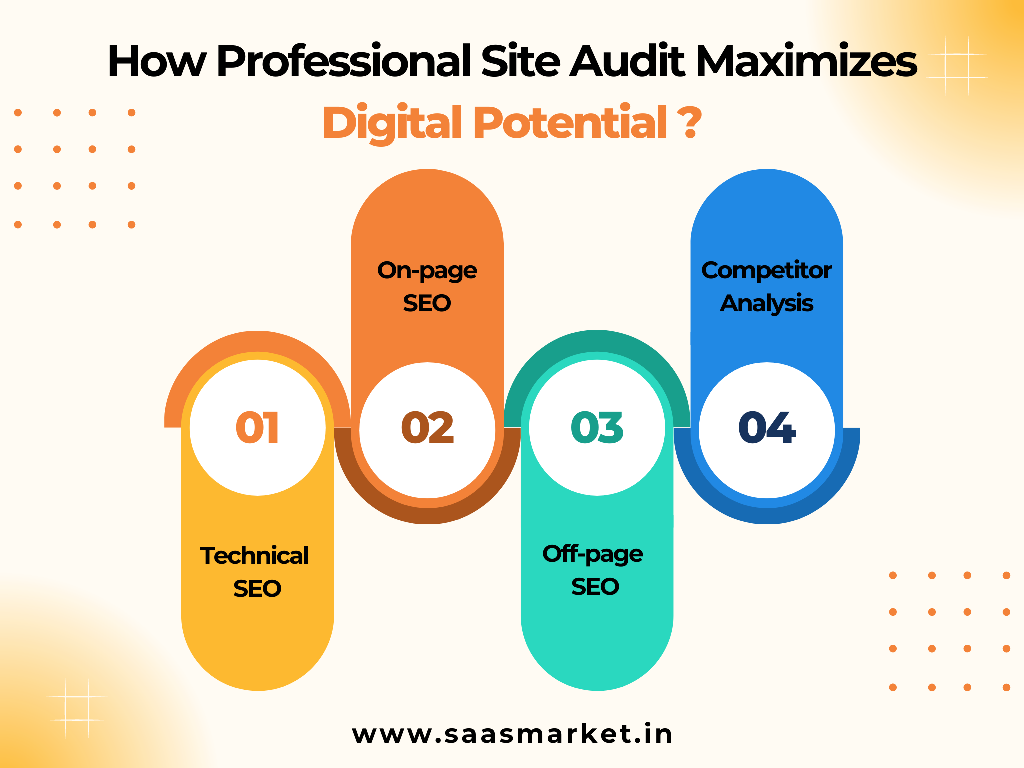The topic “Professional Site Audit maximizes the Brand potential” revolves around the concept of conducting a comprehensive site audit to enhance your website’s performance and achieve success in Search Engine Optimization (SEO).
Let’s break down this topic and explore its various aspects:
1. Introduction to Web Site Audit and SEO:
The introduction should provide a brief overview of what a professional site audit is and why it’s crucial for SEO success.
It should highlight the importance of optimizing your website to rank higher in search engine results, thereby increasing visibility, traffic, and ultimately, conversions.
2. Understanding Site Audits:
It’s the process of evaluating various elements of your website, such as technical aspects, content quality, user experience, and backlink profiling, Content Optimization etc.
A professional site audit helps identify issues that might be hindering your website’s performance in search engines.
3. Benefits of a Professional Site Audit:
This section should outline the advantages of opting for a web site audit as opposed to a DIY approach.
Professional site audits are conducted by experienced SEO experts (as SEO Services) who possess a deep understanding of the intricacies involved in optimizing a website for search engines.
4. Key Components of a Site Audit:
Break down the different aspects that are typically analyzed during professional site audit:
- Technical SEO: Address issues related to website structure, indexing, crawlability, and page speed.
- On-Page SEO: Evaluate content quality, keyword optimization, metadata, and internal linking.
- Off-Page SEO: Analyze backlinks, assess their quality, and identify opportunities for improvement.
- User Experience (UX): Review site navigation, mobile-friendliness, and overall user-friendliness.
- Competitor Analysis: Compare your website’s performance with that of your competitors.
5. The Process of Conducting a Professional Site Audit:
Describe the step-by-step process involved in performing a site audit:
- Initial Assessment: Gather data about the website’s current performance, rankings, and traffic.
- Technical Analysis: Use tools to identify technical issues like broken links, redirects, and server errors.
- Content Evaluation: Assess the quality, relevance, and optimization of your website’s content.
- Backlink Audit: Examine the backlink profile for quality and identify any potentially harmful links.
- Recommendations: Provide actionable recommendations to address the identified issues and improve SEO performance.
6. Role of a Professional Site Audit – SEO Tool:
Discuss the significance of utilizing specialized SEO audit tools to streamline the process and gather in-depth insights.
Mentioning popular tools like Ahrefs, SEMrush, Moz, and Screaming Frog etc.
7. Interpreting Audit Results:
Explain how to interpret the findings of the site audit report. Highlight the importance of prioritizing and addressing critical issues first. Issues can be rectified with SEO Website Writing Techniques.
8. Implementing Recommendations:
Emphasize the need to take action based on the audit results. Detail how to implement the suggested changes and improvements to enhance the website’s SEO performance with SEO Services.
9. Monitoring and Continuous Improvement:
Stress the importance of ongoing monitoring and optimization.
SEO Trend Analysis is an continuous process, and regular site audits help ensure long-term success.
10. Conclusion:
Summarize the key takeaways from the article. Emphasize how a professional site audit is an invaluable tool for unlocking your website’s full potential and achieving SEO success in the highly competitive digital landscape.
Remember, the actual content of each section should be in-depth and well-researched, with supporting examples, case studies, and actionable insights to provide readers with a comprehensive understanding of the topic.
Want Solutions In Terms Of Digital Presence Creation, Brand Awareness, Lead Generation, Lead Retension & Want Increase ROI ?
